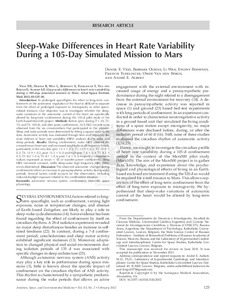Por favor, use este identificador para citar o enlazar este ítem:
https://repositorio.uca.edu.ar/handle/123456789/1652| Campo DC | Valor | Lengua/Idioma |
|---|---|---|
| dc.contributor.author | Vigo, Daniel Eduardo | es |
| dc.contributor.author | Ogrinz, Barbara | es |
| dc.contributor.author | Wan, Li | es |
| dc.contributor.author | Bersenev, Evgeny | es |
| dc.contributor.author | Tuerlinckx, Francis | es |
| dc.contributor.author | Van den Bergh, Omer | es |
| dc.contributor.author | Aubert, André E. | es |
| dc.date.accessioned | 2019-05-02T14:01:16Z | - |
| dc.date.available | 2019-05-02T14:01:16Z | - |
| dc.date.issued | 2012 | - |
| dc.identifier.citation | Vigo, D.E., et al. Sleep-wake differences in heart rate variability during a 105-day simulated mission to Mars [en línea]. Preprint del documento publicado en Aviation Space and Environmental Medicine. 2012, 83 (2). doi:10.3357/ASEM.3120.2012. Disponible en: https://repositorio.uca.edu.ar/handle/123456789/1652 | es |
| dc.identifier.issn | 0095-6562 | - |
| dc.identifier.uri | https://repositorio.uca.edu.ar/handle/123456789/1652 | - |
| dc.description.abstract | Abstract: Introduction: In prolonged space flights the effect of long-term confinement on the autonomic regulation of the heart is difficult to separate from the effect of prolonged exposure to microgravity or other space-related stressors. Our objective was to investigate whether the sleep-wake variations in the autonomic control of the heart are specifically altered by long-term confinement during the 105-day pilot study of the earth-based Mars500 project. Methods: Twenty-four-hour EKG records were obtained before (pre), during (T1: 30, T2: 70 and T3: 100 days), and after (post) confinement in the six crew members that participated in the mission. Sleep and wake periods were determined by fitting a square wave to the data. Autonomic activity was evaluated through time and frequency domain indexes of heart rate variability (HRV) analysis in wake and sleep periods. Results: During confinement, wake HRV showed decreased mean heart rate and increased amplitude at all frequency levels, particularly in the very low (pre: 13.3 ± 0.2; T1: 13.9 ± 0.3; T2: 13.9 ± 0.2; T3: 13.9 ± 0.2; post: 13.2 ± 0.2), and high (pre: 7.6 ± 0.4; T1: 8.3 ± 0.5; T2: 8.2 ± 0.4; T3: 8.1 ± 0.4; post: 7.6 ± 0.3) frequency components (values expressed as mean ± SE of wavelet power coefficients). Sleep HRV remained constant, while sleep-wake high frequency HRV differences diminished. Discussion: The observed autonomic changes during confinement reflect an increase in parasympathetic activity during wake periods. Several factors could account for this observation, including reduced daylight exposure related to the confinement situation. | es |
| dc.format | application/pdf | es |
| dc.language | eng | es |
| dc.language.iso | eng | es |
| dc.publisher | Aerospace Medical Association | es |
| dc.relation.ispartofseries | Aviation, Space, and Environmental Medicine;83(2) | - |
| dc.rights | Acceso Abierto | es |
| dc.rights.uri | https://creativecommons.org/licenses/by-nc-sa/4.0/ | es |
| dc.source | Preprint del documento publicado en Aviation Space and Environmental Medicine. 2012, 83 (2) | es |
| dc.subject | CONFINAMIENTO | es |
| dc.subject | SISTEMA NERVIOSO | es |
| dc.subject | FISIOLOGIA | es |
| dc.subject | ESPACIO | es |
| dc.subject | SUEÑO | es |
| dc.title | Sleep-wake differences in heart rate variability during a 105-day simulated mission to Mars | es |
| dc.type | Artículo | es |
| dc.identifier.doi | 10.3357/ASEM.3120.2012 | - |
| uca.path | Facultad de Ciencias Médicas|Departamento de Docencia e Investigación | es |
| uca.disciplina | MEDICINA | es |
| uca.filename | /home/data-uca-generic/folder_generic/IIBiomedicas/sleep-wake-differences-heart-rate/metadata.xml | es |
| uca.issnrd | 1 | es |
| uca.affiliation | Fil: Vigo, Daniel Eduardo. Pontificia Universidad Católica Argentina. Facultad de Ciencias Médicas. Departamento de Docencia e Investigación; Argentina | es |
| uca.affiliation | Fil: Vigo, Daniel Eduardo. Consejo Nacional de Investigaciones Científicas y Técnicas; Argentina | es |
| uca.affiliation | Fil: Vigo, Daniel Eduardo. University of Leuven. Department of Psychology; Bélgica | es |
| uca.affiliation | Fil: Ogrinz, Barbara. University of Leuven. Department of Psychology; Bélgica | es |
| uca.affiliation | Fil: Wan, Li. University of Leuven. Department of Psychology; Bélgica | es |
| uca.affiliation | Fil: Bersenev, Evgeny. Institute of Biomedical Problems of Russian Academia of Science. State Science Center of Russian Federation; Rusia | es |
| uca.affiliation | Fil: Tuerlinckx, Francis. University of Leuven. Department of Psychology; Bélgica | es |
| uca.affiliation | Fil: Van den Bergh, Omer. University of Leuven. Department of Psychology; Bélgica | es |
| uca.affiliation | Fil: Aubert, André E. University of Leuven. Interdisciplinary Centre for Space Studies. Laboratory of Experimental Cardiology; Bégica | es |
| uca.version | submittedVersion | es |
| item.fulltext | With Fulltext | - |
| item.grantfulltext | open | - |
| item.languageiso639-1 | en | - |
| crisitem.author.dept | Instituto de Investigaciones Biomédicas - BIOMED | - |
| crisitem.author.dept | Laboratorio de Cronofisiología | - |
| crisitem.author.dept | Facultad de Ciencias Médicas | - |
| crisitem.author.dept | Facultad de Ciencias Médicas | - |
| crisitem.author.orcid | 0000-0003-2291-245X | - |
| crisitem.author.parentorg | Facultad de Ciencias Médicas | - |
| crisitem.author.parentorg | Instituto de Investigaciones Biomédicas - BIOMED | - |
| crisitem.author.parentorg | Pontificia Universidad Católica Argentina | - |
| crisitem.author.parentorg | Pontificia Universidad Católica Argentina | - |
| Aparece en las colecciones: | Artículos | |
Ficheros en este ítem:
| Fichero | Descripción | Tamaño | Formato | |
|---|---|---|---|---|
| sleep-wake-differences-heart-rate.pdf | 655,65 kB | Adobe PDF |  Visualizar/Abrir |
Visualizaciones de página(s)
185
comprobado en 30-abr-2024
Descarga(s)
290
comprobado en 30-abr-2024
Google ScholarTM
Ver en Google Scholar
Altmetric
Altmetric
Este ítem está sujeto a una Licencia Creative Commons

